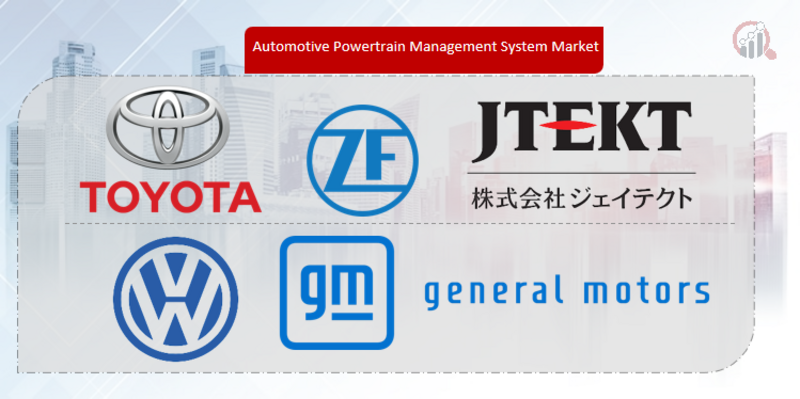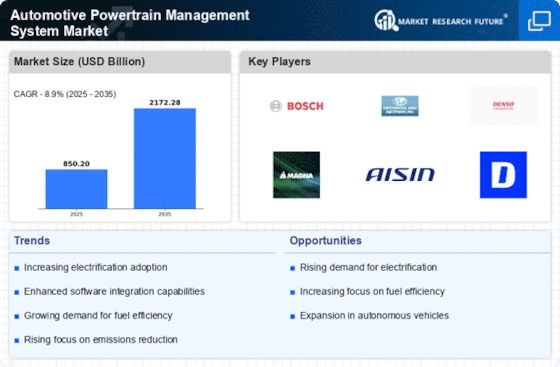Top Industry Leaders in the Automotive Powertrain Management System Market

The automotive powertrain management system (PMS) market is a fiercely competitive arena, witnessing dynamic shifts and constant innovation. Players battle for dominance, employing diverse strategies to capture and retain market share. Understanding this landscape is crucial for navigating the complexities of this ever-evolving market.
Key Player Strategies:
Technological Prowess: Leading players like Bosch, Continental, and Denso prioritize research and development, constantly pushing the boundaries of technology. They invest heavily in areas like artificial intelligence, machine learning, and advanced algorithms to optimize engine performance, fuel efficiency, and emissions control.
Strategic Partnerships: Collaboration is key in this intricate market. Established players form strategic partnerships with automakers, technology providers, and startups to leverage expertise, expand reach, and access emerging technologies. Recent examples include Bosch partnering with NVIDIA for AI-powered powertrains and Continental collaborating with Qualcomm for 5G-enabled vehicle communication.
Market Diversification: Players are broadening their focus beyond traditional combustion engines. With the rise of electric vehicles (EVs), companies are actively developing PMS solutions for hybrid and fully electric powertrains. This diversification mitigates exposure to potential market declines in specific segments.
Regional Expansion: Emerging markets like China and India present lucrative growth opportunities. Established players are vigorously expanding their presence in these regions through local production facilities, strategic partnerships, and tailored product offerings.
Cost Optimization: With increasing price sensitivity, players are streamlining manufacturing processes, optimizing supply chains, and exploring alternative materials to offer cost-competitive solutions without compromising on quality or performance.
Factors for Market Share Analysis:
Product Portfolio Breadth: Offering a comprehensive range of PMS solutions for various engine types, vehicle segments, and regional specificities provides a competitive edge.
Technological Advancement: Continuous innovation in areas like fuel efficiency, emissions control, and connectivity features attracts customers and fosters brand loyalty.
Brand Reputation and Reliability: Established players with a strong track record of quality and reliability hold an advantage in a market where trust is paramount.
Pricing and Value Proposition: Striking the right balance between cost-effectiveness and feature-rich offerings is crucial for attracting budget-conscious buyers and technology enthusiasts alike.
Customer Service and Support: Providing prompt and efficient after-sales service builds customer trust and enhances brand image.
New and Emerging Trends:
Connected Powertrains: Integrating PMS with advanced telematics and communication technologies allows for real-time data monitoring, remote diagnostics, and predictive maintenance, improving efficiency and reducing downtime.
Cybersecurity: As PMS become more interconnected, robust cybersecurity measures are essential to protect against hacking and data breaches.
Electrification: The surge in EV adoption drives research into efficient PMS solutions for hybrid and electric powertrains, focusing on battery management, energy recuperation, and range optimization.
Personalization: Adapting PMS to individual driving styles and preferences through customizable settings and AI-powered algorithms offers a unique user experience and increases customer satisfaction.
Sustainability: Developing eco-friendly materials and optimizing fuel consumption through advanced algorithms contribute to reducing environmental impact and meeting emissions regulations.
Overall Competitive Scenario:
The automotive PMS market is characterized by intense competition, with established players vying for dominance alongside innovative startups and technology giants entering the fray. Technological advancements, regional expansion, and diversification into EVs are key drivers of market growth. To succeed in this dynamic landscape, players must demonstrate continuous innovation, agility, and a customer-centric approach, balancing cost-effectiveness with cutting-edge features. Adapting to emerging trends like electrification, connectivity, and personalization will be crucial for securing a lasting competitive edge.
Industry Developments and Latest Updates:
Toyota Motor Corporation:
October 26, 2023: Announced collaboration with a university to develop AI-powered powertrain control systems for hybrid vehicles.
December 19, 2023: Unveiled a new fuel injection system with improved atomization for enhanced engine efficiency and emissions reduction.
Hyundai Motor Company:
November 8, 2023: Showcased its next-generation powertrain management system at CES 2024, featuring real-time optimization for both internal combustion engines and electric motors in hybrid vehicles.
December 20, 2023: Partnered with a European chipmaker to develop advanced microcontrollers for high-performance powertrain control.
JTEKT Corporation:
October 20, 2023: Introduced a compact and lightweight transmission control unit for high-efficiency automatic transmissions.
Top Companies in the Automotive Powertrain Management System industry includes,
Toyota Motor Corporation
Hyundai Motor Company
JTEKT Corporation
ZF Friedrichshafen AG
Volkswagen AG
Ford Motor Company
General Motors Company
GKN plc
Borgwarner Inc.
Aisin Seiki Co. Ltd
Valeo
Hella KGaA Hueck & Co.










